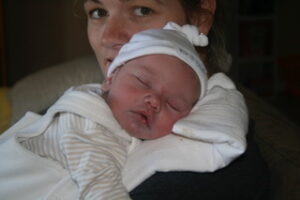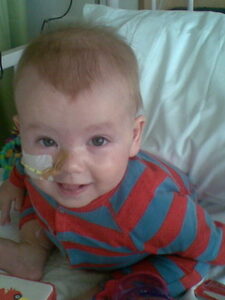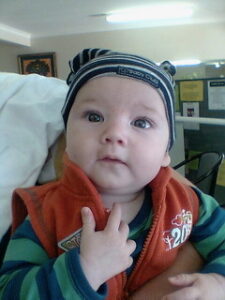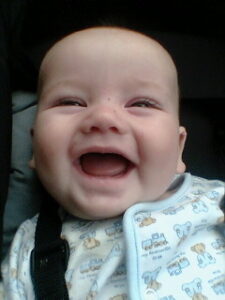
20 Aug 2024
“Thanks for the kisses from the sky” – Eli’s story
While based in the UK and funding UK researchers, Leukaemia UK’s work has worldwide impact for the treatment of blood cancers. Dr Giulia Orlando’s research project is being supported by a family from Australia whose little boy died of a rare form of leukaemia. Jodie and Pete Simpson, from near Bairnsdale, Victoria, are generously giving funding towards her work in the hopes that one day other families won’t have to go through the devastating loss they have experienced.

Eli was just 15 weeks old when he started showing symptoms.
Little Eli Simpson was just 15 weeks old when he began to show symptoms that would quickly become fatally aggressive leukaemia. Eli was nicknamed Melon by his dad for the size of his head – a family trait – when he was born on 28th September 2007. The little boy was a typical, bouncing healthy baby. But just a few months later in January 2008, Jodie and Pete spotted something wasn’t right.
“He had bruising, and we also saw tiny red dots on his legs,” said Jodie, who was working as a public servant at the time. “He also had blood in his poo and high temperatures. We immediately went to our doctor, who initially thought he might have a bowel obstruction. He referred us to a pediatrician, who was normally in Sale which was 1.5 hours away from us, but that day was in Bairnsdale just 30 minutes away. We got an appointment to see him at 6pm. He had a feel of Eli’s liver and requested a blood test the following morning.”
After completing the blood test the next day, Jodie took Eli to a kids’ pool party that was scheduled with a small group of friends who all had children around the same age as their son. But at 2pm Jodie’s phone rang.
“The doctor said: ‘Eli has leukaemia, Melbourne are expecting you. Grab some things and present to the Monash Hospital, the emergency department.’ Eli was our first son. He was 15 weeks old. We were petrified of what was ahead of us. We packed Eli’s and our things and drove for four hours, so scared and sad of the unknown. We did not know how long we were going to be gone for, or the next steps.
“We stayed in hospital for 10 days. Eli had a bone marrow biopsy and lots of blood tests. During that time and before diagnosis, we were allowed home, but had to make the trip to Melbourne every Monday so that Eli could have blood tests and they could keep an eye on him. It took a further six weeks to determine that Eli had Juvenile Myelmonocytic Leukaemia (JMML).”
JMML is a very rare form of chronic blood cancer affecting children. There are very few effective treatments and the only chance of a cure is a bone marrow transplant. Despite scientific researchers discovering the genetic link to most forms of JMML 30 years ago, there have been no advancements in new treatments. This is critical as, even with a transplant, 35% of children experience a relapse. It’s so rare it affects just 1.2 children in every million – that’s just 3000 children worldwide.

Eli underwent several intensive treatments
“Eli was given two rounds of intensive chemotherapy each lasting five days, and then three weeks recovery. “We were so tired. We travelled four hours one way each time we had to be in Melbourne. It was incredibly stressful. It also meant that, during the time we were there, we were away from our support network and our family – and that was up to four weeks at a time if Eli stayed well. Pete’s work was fantastic. He was allowed to work from Melbourne during the times we were in hospital, but it did take its toll.”
“Eli then had to get his spleen removed and be prepared for a bone marrow transplant in June. The treatment plan for the transplant was terrible. Ten days of strong chemotherapy killing his ‘bone marrow factory’, so he could take on his donor’s. At one stage, he had a medicine so toxic he had to have a bath every six hours for 24 hours. After the transplant Eli, who was still trying to breastfeed, had to be in isolation for 28 days.
“We fought to have him breastfed, but he lost the ability to feed as the transplant treatment plan gave him mouth ulcers. But I expressed milk and he had it through his nasogastric tube. We were all together as a family but isolated from everyone else. Pete stayed with Eli overnight, and I did days so I could give him his milk. It was very hard. We were in a room no bigger than 5×5 metres, robed up and masked for the first few days. He was amazing to get through what he did.
“After the transplant we made it home for a few weeks just after his first birthday where we felt we could start to be ourselves again. But Eli got sick about four weeks after being home, and we were back in hospital. We still do not know what ‘triggered’ his next round of illness. Two weeks later, he died of a pulmonary haemorrhage – a complication of his transplant.”
Eli died on 16 November 2008 – six weeks after his first birthday. Jodie and Pete were asked by the hospital if they would like to donate tissue samples from Eli for research, and agreed to do so in the hopes it would help researchers study what led to his death.
“As part of his legacy, we wanted to find out more and support research into JMML. We found Dr Guilia Orlando from Oxford University who is being funded by Leukaemia UK to research the disease. To have found a researcher looking into JMML is incredible. I have been looking for this specifically for 15 years. Every year, I jumped onto the internet to see who was doing what. I feel like we have hit the jackpot. We have many family members and friends who are also very excited about this work being done and we will continue to do what we can to make a difference for other JMML families.”
JMML cells carry mutations in the DNA which activate a mechanism inside cells called the RAS pathway. The cancer is characterized by the excessive production of monocyte white blood cells in the bone marrow, which can get into organs such as the spleen, liver, lungs, and gastrointestinal tract.
To find new effective treatments for JMML, Dr Giulia Orlando is looking for potential drug ‘targets’ – proteins inside cells which, when blocked, could kill JMML cells or stop them growing. The mutations which activate the RAS pathway that often occur in JMML lead to changes in the activity of many genes. In her Leukaemia UK-funded John Goldman Fellowship, Giulia is investigating exactly how activation in the RAS pathway leads to these changes in gene activity. By doing so, she hopes to find potential vulnerabilities that can be exploited, and so identify potential drug targets.

Eli’s memory is still with his parents every day.
“Being a mom of two young children I cannot even imagine the courage and strength Eli’s parents had in confronting with Eli’s diagnosis,” said Dr Orlando. “I am hoping we can improve JMML treatment by developing novel strategies. JMML is caused by the activation of RAS pathway. Targeting this pathway has been challenging and research has so far focus on understanding how the pathway works in the initial stages, but little has been done to understand its role in regulating cell identity during haematopoiesis. My research aims to understand the mechanisms driving changes in the ability of stem cells to normally differentiate. This knowledge will allow to target RAS pathway in a novel way.
“Thanks to the generosity of parents like Eli’s and the funding provided by Leukaemia UK, we have been able to collect samples from affected children and characterised their stem cells at the molecular level. This dataset will pave the way to identify novel vulnerabilities that will hopefully translate into clinical avenues. Unfortunately, there is not enough research on JMML as it is rare. However, RAS pathway activation is very common not only in leukaemia, but also in solid tumours. Studying JMML can help other malignancies and I am hoping to raise awareness on how this research can have broader reach.”
“Since we lost Eli we have gone on to have two more boys, Archie who is now 13 and Alfie Eli who is eight years old,” said Jodie. “Eli’s memory is still with us every day. As Pete said at Eli’s funeral, the flags in our hearts forever fly at half-mast. Our boys live every day with their older brother’s memory. We have beautiful wedge-tailed eagles and sea eagles where we live. When we see them, which is not too often, we all say: “Hello Eli, and thanks for the kisses from the sky”. Pete and I have definitely had our ups and downs. But honestly, Eli is the glue that keeps our family together. Anniversaries, like the date he died and his birthday, are especially tough. We often wonder what type of young man he would be. It’s the simple things but we know he is with us every day.
“Twelve years ago, we started a not-for-profit foundation, and we opened Melon’s Cottage in Kalimna, East Gippsland. It was the little house we bought Eli home to after he was born. When we were in hospital, we decided to dedicate it to families and carers of kids with leukaemia or cancer, regardless of Eli’s outcome because we saw the need to help other families like ours. It took us nearly four years to get all the legalities and constitution sorted so we could house families for respite. Now families going through their children’s cancer or leukaemia, or even having lost a child, can stay free of charge and have a break together. We have had over 100 families stay with us since we opened, which is amazing. Our community is fantastic with some of the businesses helping us with vouchers for the families and even a boat ride around the Gippsland Lakes for free.
“We are so proud Eli chose us to be his mum and dad and hope that the day comes when other families don’t have to go through what we have had to. We know a cure is in the future but, in the meantime, we feel this is something we can do to help in the present. While it has been nearly 16 years since we lost him, we still hold hope that his legacy helps others.”
Discover more stories from our community.

Eli’s legacy lives on through his parents ongoing work.
Related posts
22 May 2023
Can the unique differences between stem cells tell us how well CML treatment will work?
What if we could predict how chronic myeloid leukaemia (CML) patients will respond to treatment? Could the unique signatures of CML stem cells hold the key to personalising treatment for…
4 April 2022
Leukaemia UK launches search for five new talented Trustees
We are looking for a talented and diverse set of Trustees to join our Board, and help guide the charity as we embark on an ambitious new strategy to accelerate progress in leukaemia research to stop leukaemia devastating lives.
11 January 2019
Lymphoma: Understanding relapse and treatment resistance
Dr Dinis Calado, The Francis Crick Institute and Project Grant Holder
3 February 2022
Leukaemia UK awarded Christmas Grant to support life-saving research
Leukaemia UK are delighted to have been awarded a special Christmas Grant from Kusuma Trust UK.